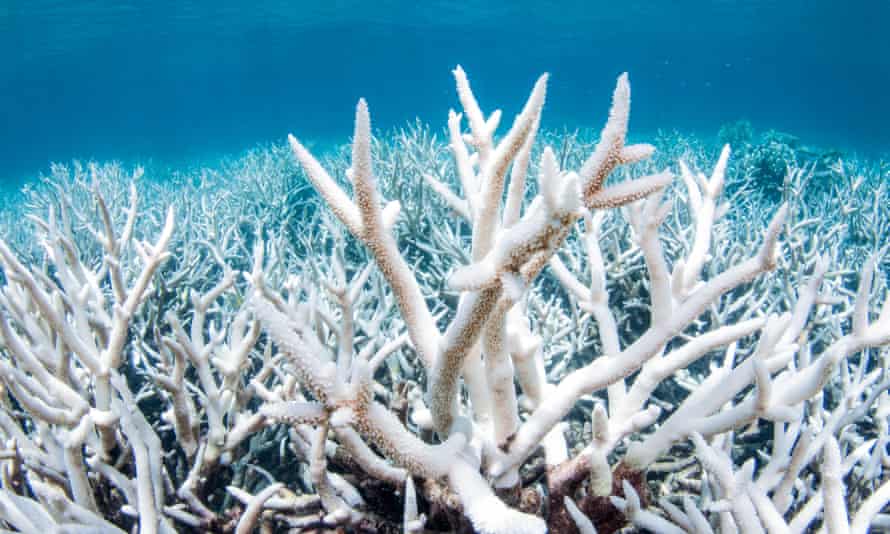The government must take responsibility for the Great Barrier Reef and stop looking for someone else to blame
When Unesco recommended the reef be placed on the ‘in danger’ list, the Coalition’s response was to shift the blame. We must do better

Escaping responsibility has become the recurrent theme of the Morrison government. Whether it is the glacial progress of the vaccination rollout, dealing with the megafires two summers ago, or the parlous state of the Great Barrier Reef, someone else is always to blame.
When Unesco released its recommendation to the World Heritage Committee in June to place the Great Barrier Reef on the “in danger” list, the first reaction of the federal government was to blame China.
China is the chair of this year’s committee meeting and given its standing in the international arena, “how good” was it for the government to use Chinese influence as a straw man. Planting a conspiracy theory with a willing media accomplice is too easy, and sure enough the Australian broke the story with a headline shouting “China-led ‘ambush’ on health of the Great Barrier Reef”.
This unsubstantiated claim of Chinese plotting – and Unesco’s response that no country was involved in recommendations to the World Heritage Committee – was swiftly followed by claims of procedural unfairness. The government then alleged it was “blindsided” and “stunned” by Unesco’s decision. The prime minister Scott Morrison called Unesco’s processes “appalling”. Unesco repudiated these criticisms too.
The UN body followed proper process used over many years. It never shares recommendations to the committee with any country. Imagine if it did? The lobbying behind the scenes, outside any public scrutiny to weaken draft decisions, would be intense. Notably Australia never complains about this process when it agrees with a recommendation.
The government’s spin doctors then shifted the narrative to the shakier ground of climate, with the environment minister Sussan Ley claiming the reef is being used as a political football and that it needed global action on climate change to ensure its protection. Coming from a government that has politicised climate change for more than a decade, and was recently ranked at the bottom of the ladder for action on the climate crisis, this was as laughable as it was damaging to our international credentials.
Shifting blame on to international organisations is typically the last card played by governments unhappy with the assessment of peers and desperate to deflect scrutiny of domestic policy. Australia’s attempt to use climate as a debating point to cover its policy shortfall was clumsy, and flew in the face of our key allies and trading partners’ commitments to emissions reductions that are far greater than ours.
For most of its 44-year existence, the committee has accepted the sound technical advice of Unesco and its natural heritage advisory body, the IUCN. But it is the case that in recent years the committee – a group of 21 countries – sometimes shied away from making tough decisions that put conservation and protection first. On occasion draft decisions have been weakened and action delayed.
When Australia joined the World Heritage Committee , the head of our delegation said the trend for setting aside sound technical advice was undermining the credibility of the world heritage convention and that “as custodians of the convention, the committee can and must do better”. He promised Australia “will be an advocate for upholding the technical integrity of the committee. We will place great weight on the analysis and advice of the advisory bodies”.
Australia had it right then but how hollow these words ring now when one of our own sites is being considered for the “in danger” list and the Coalition furiously scrambles to weaken the recommendation. In this case the government has form.
In 2014, Greg Hunt, then the environment minister, launched a successful diplomatic lobbying effort to try to convince committee members not to place the Great Barrier Reef on the “in danger” list. Australia managed to avoid the in-danger listing of the reef three times from 2012 to 2014, as evidence accumulated of the deterioration of one of the world’s greatest natural wonders. Each time the committee gave the Australian government one more chance.
In 2015, a long-term sustainability plan to ensure the survival of the reef was unveiled and the committee finally welcomed Australia’s efforts to protect our global icon.
Now in 2021, after three severe coral bleaching events fuelled by global heating and very slow progress in meeting the water quality targets promised to the committee, another diplomatic assault is in full swing. This is the most egregious aspect of the current controversy, other than the escalating risk to the reef.
During the period of Japan’s so-called “scientific” whaling in the Antarctic – which Australia strenuously opposed – I appreciated how focused diplomatic effort can make a significant difference in international campaigns. But these are exceptional exercises that should be conducted with a genuine national and international interest at their core.
With the reef, to deflect the inadequacy of our domestic policies, we will expend substantial financial resources to rescue the government’s reputation, with Ley heading off on a week-long junket overseas and senior bureaucrats diverted from serious work.
It won’t have escaped anyone’s notice that in rejecting Unesco’s advice, the Morrison government is conveniently ignoring that much of it is based on technical and scientific reports produced by the Australian government, with the Great Barrier Reef Marine Park Authority downgrading the outlook for the reef from “poor” to “very poor” in 2019. This advice has been coming for a decade.
Listing the site as “in danger” is an opportunity for the Australian government to unite with the rest of the world to fight climate change and to protect the outstanding universal value of the reef.
Instead, the government is fighting Unesco. Surely we can and must do better.